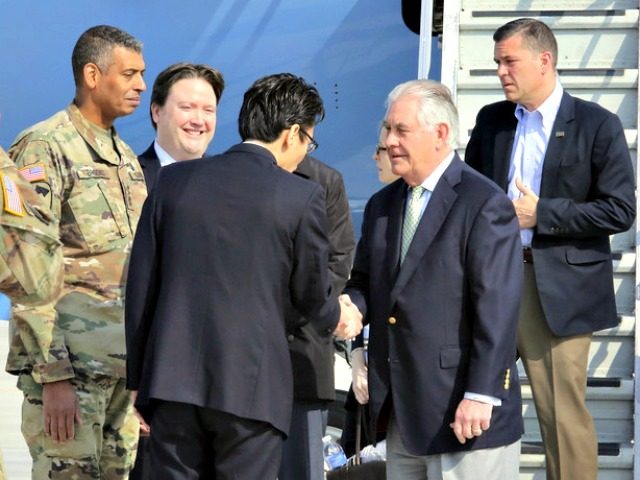WASHINGTON – Critics of the Trump administration slammed Secretary of State Rex Tillerson’s comment that “all options are on the table” if North Korea elevates the threat of its nuclear weapons program.
“As Member of Foreign Affairs Cmte, I call on #Tillerson to stop making war-like stmts about N. Korea,” tweeted Rep. Ted Lieu (D-CA).
But some Asia policy experts noted that that warning is not new, and certainly nothing to get hysterical about.
“We should not work ourselves into hysterics over such comments. In fact, all U.S. presidents in the recent past from Barack Obama to George W. Bush have used the phrase ‘all options are on the table’ in one situation or another — Iran comes to mind most recently,” said Harry J. Kazianis, director of defense studies at the Center for National Interest.
In March 2014, then-Secretary of State John Kerry said “all options are on the table” to hold Russia accountable for invading Ukraine, including economic sanctions and potentially military action, according to an ABC News article.
In March 2013, former President Obama said “all options were on the table” with Iran, according to a CBS News article.
More recently, In October, surrogates for President Trump and Hillary Clinton both said at a discussion that neither candidate would take options off the table when it came to North Korea.
“It does not mean war is coming tomorrow, it just means we are ready for whatever the future brings from Pyongyang, and that is not controversial at all—it’s reality,” said Kazianis.
Another North Korea expert agreed.
“All options have always been ‘on the table,'” said Jennifer Lind, an associate professor at Dartmouth College.
Lind said it is also too early to tell if Trump’s policy is actually all that different from Obama’s. She said in an email to Breitbart News:
From Tillerson’s statements it appears that the Trump admin…
…thinks strategic patience has failed (Yes, all candidates say that but then they adopt this policy.)
…is keeping all options on the table (just like all previous administrations)
…wants China to do more and will push China to do more (A favorite trope by those who are out of ideas. Obama, Bush have already pushed Beijing to do more; it hasn’t and won’t. Our interests and China’s interests are not the same here.)So there we are for now. In sum, this is not as yet a departure from previous US policy. Which is good news in my mind, given the alternatives.
Indeed, Tillerson himself said U.S. policy towards North Korea has not changed, in an interview with the Independent Journal Review published Saturday. Asked whether his view that Japan and South Korea do not need to develop nuclear weapons has changed, he replied:
No, it has not, nor has the policy of the United States changed… We say all options are on the table, but we cannot predict the future. So we do think it’s important that everyone in the region has a clear understanding that circumstances could evolve to the point that for mutual deterrence reasons, we might have to consider that.
But as I said yesterday, there are a lot of… there’s a lot of steps and a lot of distance between now and a time that we would have to make a decision like that. Our objective is to have the regime in North Korea come to a conclusion that the reasons that they have felt they have had to develop nuclear weapons, those reasons are not well-founded. We want to change that understanding.”
However, experts and officials say there are some subtle changes.
Tillerson said “the policy of strategic patience has ended. We are exploring a new range of diplomatic, security and economic measures.”
He said those measures included fully implementing sanctions already approved by the United Nations Security Council, and bringing new states into talks on how to address North Korea.
Experts say one change was the speeding up of the deployment of the THAAD missile defense system to South Korea, which was first announced during the Obama administration.
“The Trump Administration has acted boldly in just the last few weeks in deploying the THAAD missile defense system—knowing China would be angered,” Kazianis said. “While THAAD clearly won’t save South Korea from a massive salvo of North Korean missiles, it does send a strong signal that Washington will back its ally and that the tough campaign rhetoric of 2016 was just that.”
Kazianis also recommended sending THAAD to Japan.
“The Trump administration should also send THAAD to Japan in an effort to make sure Tokyo also has all the tools it needs to stop an attack by North Korea on its own territory,” he said.
Lind said the Trump administration doesn’t have many good options, and that it’s too early to tell whether there has been any policy change.
A policy of engagement in hopes of making a deal with North Korea has been tried, with North Korea cheating.
Regime change would “almost certainly go nuclear,” she said, possibly killing millions of people, and creating devastation in North Korea and possibly Japan. There are about 28,500 U.S. troops stationed in South Korea.
A limited strike option — where the U.S. and South Korea could try to take out North Korea’s weapons program — is problematic, since its facilities are deeply hidden underground, and a limited strike could escalate into a war.
“So all three options are terrible, bringing us back to what is our actual policy: understanding that North Korea is a nuclear weapons state and relying on deterrence to prevent war,” she said.

COMMENTS
Please let us know if you're having issues with commenting.